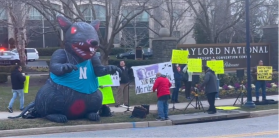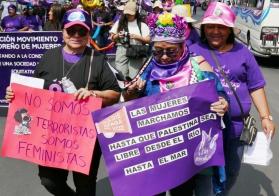Right Wing Unites to Protect Media from Money Laundering Investigations
El Salvador’s right wing has closed ranks to shield the nation’s notoriously conservative media companies from investigations, voting on August 14 in the National Legislative Assembly to exempt the media and advertising agencies from certain measures in a recently reformed Anti-Money Laundering Law.
Last month, all parties approved reforms to the anti-money laundering legislation following a heated and drawn out political debate regarding which entities and individuals would be subject to particular scrutiny. Those indicated, from politicians and political parties to business and recreational groups, are required to provide reports to the Financial Investigations Unit of the Attorney General’s office regarding transactions involving $10,000 or more in cash and $25,000 or more in other forms. In an about face, the right-wing parties later approved additional reforms to exempt media and advertising agencies from self-reporting, despite the fact that they originally voted for them to be required to do so.
The Right now claims that subjecting the media to the Anti-Money Laundering Law would endanger their constitutional right of freedom of expression—the same dubious argument recently raised to try and exempt media owners from paying income tax. Legislator Norma Guevara of the governing leftist Farabundo Martí National Liberation Front (FMLN) party accused the opposition parties of protecting corrupt media companies, tweeting: “those who pay for denigrating campaigns in the media with illegal money remain protected by the reform.”
The passage of reforms to the Anti-Money Laundering Law was purportedly the final of several controversial policy conditions leveraged by the US Embassy in exchange for the approval of Millennium Challenge Corporation (MCC) development aid to El Salvador. US Ambassador Mari Carmen Aponte mounted a forceful public pressure campaign around the law, insisting that elected officials and other political figures be subject to extra scrutiny while threatening to withhold the disbursement of nearly $300 million in MCC funding. But although Ambassador Aponte was a key figure in the debate around the inclusion of political actors, she has been notably absent from the discussion that resulted in the media’s exception from the law’s scrutiny. Meanwhile, with the Embassy’s last condition finally forced through, there is still no word on the status of the contested MCC development aid package.

 "I am a CISPES supporter because continuing to fight for social justice and a more people-centered country means continuing the dream and sacrifice of thousands of my fellow Salvadorans who died for that vision.” - Padre Carlos, New York City
"I am a CISPES supporter because continuing to fight for social justice and a more people-centered country means continuing the dream and sacrifice of thousands of my fellow Salvadorans who died for that vision.” - Padre Carlos, New York City

